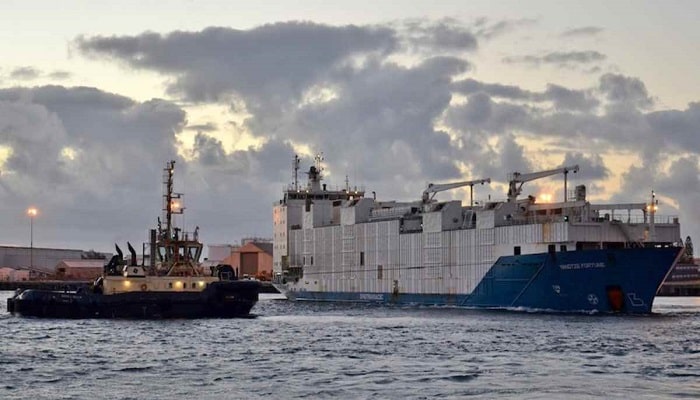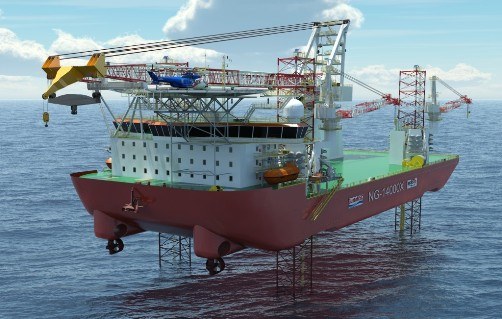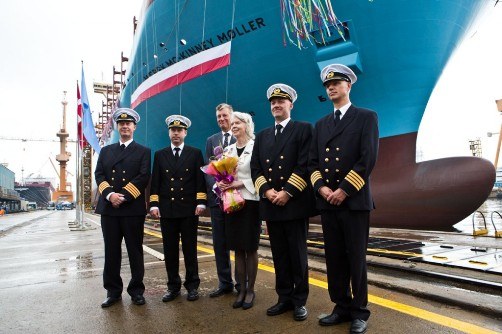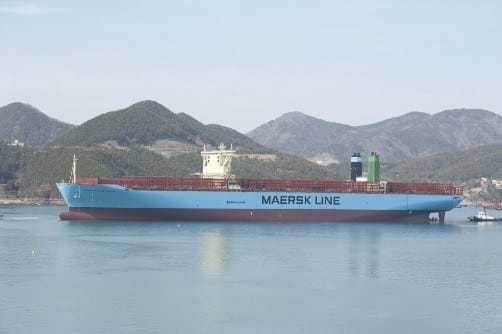ITF Secures Freedom For 13 Abandoned Filipino Seafarers Stuck In Singapore For 5 Months; $1m In Backpay Won For Crews
Thirteen Filipino seafarers have made it home after more than five months aboard an abandoned livestock carrier ship, the Yangtze Harmony, thanks to the intervention of the International Transport Workers’ Federation (ITF).

The ship’s owners abandoned the vessel and its crew after the ship was arrested in October 2022 in Singapore over an unpaid fuel bill. That is when the shipowner also stopped paying the entire crew, leaving them without wages or a way to get home. By April, the crew were owed a massive USD $429,972.
The ITF said the Harmony’s Hong Kong-based shipowner had a long history of abandoning crew, and its vessels have been detained before for violating safety and crew welfare rules.
But what the ITF’s inspectors didn’t expect, however, was that the shipping company would abandon another crew in addition to the Harmony at the same time.
Between the Yangtze Harmony (IMO 9318917) and the Yangtze Fortune (IMO 9336282), the ITF’s months of advocacy would recover USD $1 million in backpay owed to the crew, as well as flights home and the feeling of freedom for every one of the 43 thankful seafarers.
This is their story.
A tale of two ships – abandoned by one owner
Soar Harmony Shipping Ltd abandoned the Yangtze Fortune (IMO 9336282) after the Harmony’s sister vessel, also a livestock ship, was seized by the Australian Federal Court at Portland, Victoria over the owner’s refusal to make urgent repairs.
The crew of the Fortune turned out to be much more fortunate than their fellow Filipino colleagues aboard the company’s sister ship at anchorage in Singapore.
The first reason was that more than half the Fortune’s crew went home in a matter of weeks, rather than languishing on board for more than five months — as was experienced by the entirety of the Harmony’s crew in Singapore.
ITF Australia confirmed when one of the abandoned mariners, the cook, had a death in his family, the ITF along with the Marshall and Port State Control (AMSA), were able to coordinate his early release from the vessel, meaning the seafarer was able to be home and amongst his loved ones for the funeral.
A further 19 of the crew went home, fittingly, on 19 January. This mass repatriation was only possible because the ITF successfully lobbied to have the Fortune’s flag State reduce the ship’s minimum manning levels.
The ITF was able to make the case for reduced manning levels when it become clear that the Fortune would not be leaving anchorage anytime soon, with expensive repairs still required by Australian authorities before being permitted to sail anywhere.
Ships which are ‘laid up’ (or can be considered non-operational for another reason) typically don’t need the same crewing levels as ships engaged in open ocean navigation or where a higher manning level to navigate through busy shipping lanes.
For the Fortune, the change saw its minimum crewing number reduce to 16. They went home early this month.
Communication is key for crew
The second major difference between the two crew’s experiences of abandonment comes down to communication. Specifically – communication with the crew about their labour and human rights, and the various requirements which exist for parties with obligations to uphold them.
In Australia, the crew had clear communication about what was happening to their case. They knew how to access shore leave and medical care. The Fortune’s crew were visited several times by local welfare and union representatives – including the ITF.
The 16 who chose not to go home when the crewing requirement was dropped even enjoyed a Christmas dinner on board, courtesy of the Salvation Army, with good spirits helping to speed up the days until the ship’s sale and the seafarers’ many thousands in wages finally paid out.
The Australian Federal Marshall kept the Fortune’s crew updated on the ship’s progress towards its sale. This regular communication put emphasis on providing options to crew to consider, reiterating key information about their various labour and human rights, such as those under the Maritime Labour Convention (2006, as amended).
The Fortune’s crew did not have to endure months of uncertainty and confusion at their situation for the period the two vessels were under arrest by the respective countries’ authorities.
Crew were kept updated about likely timelines, and provided the reasons behind any delays. Efforts were made to avoid legal wrangling between parties involved in the ship’s arrest and sale from getting in the way of seeing the seafarers paid their owed wages or flown home at the earliest opportunity.
Australian system working well
“We’re all very relieved to see the crew of the Yangtzee Harmony finally going home, better yet with half a million dollars of their owed wages in hand,” said Ian Bray, National Coordinator of the Australian ITF Inspectorate.
“It’s good to see the 13 crew members of the Harmony joining the 36 of the Fortune who also went home recently. In both Singapore and Australia, the ITF has been effective in our interventions to see the two crews freed, paid what they’re owed for time on board, and repatriated home safely to their families.”
Bray said the common-sense, compassionate approach to repatriation and crewing levels indicated that Australia’s systems for dealing with abandonment were functioning well, appearing to prioritise crew welfare and human rights where possible.
“We’ve secured for these seafarers more than a million dollars in owed wages – money that I very much doubt crew would have reached their pockets, if not for the relentless advocacy of my colleagues Matt Purcell and Sandra Bernal,” he said.
“But I can’t help noting that the process took more than two months longer in Singapore than it did in Australia. Adhering to the rights of seafarers shouldn’t be a lottery for crew.
Their rights are their rights no matter where they find themselves being underpaid, exploited, or abandoned. All port states must be encouraged to respond more quickly in the interests of seafarer welfare.”
Singapore’s legal system leaves crew in limbo
On 25 October 2022, the Singapore Sheriff court seized the Yangtze Harmony on behalf of Glander International Bunkering over an unpaid fuel bill. That began a legal process to sell the ship and pay off its debts, including the USD $429,972 in unpaid wages owed to the crew.
While lawyers, insurers and bureaucrats slowly processed the case on shore, the seafarers waited and waited. Unable to return home to the Philippines, or to work and send money in their stead, their families struggled with their absence – emotionally and financially.
Some fell deeper into debt as a consequence, and in one case money ran out, leaving a seafarer’s loved one unable to pay for mounting medical bills.
“It’s a complex process in any jurisdiction when a shipowner defaults on payments,” said Steve Trowsdale, the ITF’s inspectorate coordinator. “But authorities must realise they have a clear responsibility under international law to act swiftly in cases where crew welfare is in jeopardy.”
Singapore ratified the Maritime Labour Convention (MLC) in 2011. This specifies how cases of abandonment should be handled. Trowsdale argues that in delaying proceedings for more than five months, Singapore may have contravened the MLC.
Trowsdale said he was looking forward to the upcoming publishing of joint ILO-IMO guidelines authored by the ITF and shipowners’ association ICS.
The Guidelines on how to deal with cases of seafarer abandonment are aimed at port states (in this case, Singapore and Australia). They make clear that port states should prioritise getting crew home first and worry about money matters later.
They explain how port states can adhere to the provisions of the MLC through practical examples, such as replacing the abandoned crew, wherever possible, with a local team. Or by relieving by putting the vessel in dry dock, or shifting it to a guarded anchorage. All of these methods can reduce the number of seafarers required to stay on board for safety and watchkeeping.
Swedish quibbles while seafarers suffer
The Swedish P&I Club provided the financial security insurance for this ship. Under the MLC, if a shipowner fails to pay crew, the insurer should pay up to four months of the owed wages and cover the cost of crew repatriation. However, the P&I club initially delayed payment, insisting that it needed a court order first.
“That’s not how insurance is supposed to work,” said Trowsdale. “The policy is due to be paid whether or not Swedish has a letter from the court, and whether or not Swedish thinks it can reclaim its costs. Their losses are not a concern for crew – ever. This money should have been paid out immediately to crew for their owed wages.”
Swedish eventually did pay the crew; after initially getting the account number wrong.
Port states must do better to protect abandoned crew’s mental health
Sandra Bernal is the ITF’s Flags of Convenience Campaign Network Coordinator for Asia Pacific. She has been leading ITF’s advocacy for the Harmony’s crew, working day and night for almost six months to get the 13 home and paid.
“The seafarers on board the Yangtze Harmony were suffering from fatigue, anxiety and stress, of that there is no doubt,” she said, “As would anyone dropped into a distressing and confusing situation such as this – abandoned far from home.”
Bernal said the contrast between the way authorities in Singapore and Australia handled the two abandonment cases showed how a port state’s response to an abandonment can make a huge difference to the immediate welfare and mental health impacts for affected crew.
“In Australia, efforts were made by authorities to inform crew of their rights, to check on their welfare, and to put their human needs above the commercial interests of the parties vying for a share of the ship’s sale value. There are elements of this kind of approach that I would like to see more widely adopted across port States.”
“I am just thrilled that they are finally home,” said Bernal. “I was in daily contact with them, and at times I was very worried about the impact that the uncertainty was having on their mental health.”
“We have to remember that abandoned seafarers are not criminals – they are the victims in this situation.
They are only there because their employer, the shipowner, let them down and did wrong by them. Crew should never be made to pay the price of their employer’s negligence – in money, time, or mental wellbeing,” said the coordinator.
CREW SAY ‘THANK YOU ITF’
From the daughter of the third engineer
“Dear Ms Sandra, thank you so much once again, at last my father is finally here with us. Thank you so much for bearing with me, for being so responsive with all my queries and for helping all the crew.”
From the Harmony’s Captain
“Dear Sandra, Your full support all these months, Much appreciated…Thanks GOD and to you for guiding us Happy Easter too and God Bless you.”
From Harmony’s Crew
“Ms Sandra, I am/we are very thankful of you and the ITF for helping us in this matter. Praying that God will blessed you more and the ITF. Thanks again for all your help to us.”
“Ms Sandra thanks so much for all you care, guidance and support for us. We can go home now and have our salaries. God bless you much and the ITF.”
“Madam Sandra thank you for helping us and always responding my emails. God bless you always.”
Reference: International Transport Workers’ Federation
Disclaimer :
The information contained in this website is for general information purposes only. While we endeavour to keep the information up to date and correct, we make no representations or warranties of any kind, express or implied, about the completeness, accuracy, reliability, suitability or availability with respect to the website or the information, products, services, or related graphics contained on the website for any purpose. Any reliance you place on such information is therefore strictly at your own risk.
In no event will we be liable for any loss or damage including without limitation, indirect or consequential loss or damage, or any loss or damage whatsoever arising from loss of data or profits arising out of, or in connection with, the use of this website.
Disclaimer :
The information contained in this website is for general information purposes only. While we endeavour to keep the information up to date and correct, we make no representations or warranties of any kind, express or implied, about the completeness, accuracy, reliability, suitability or availability with respect to the website or the information, products, services, or related graphics contained on the website for any purpose. Any reliance you place on such information is therefore strictly at your own risk.
In no event will we be liable for any loss or damage including without limitation, indirect or consequential loss or damage, or any loss or damage whatsoever arising from loss of data or profits arising out of, or in connection with, the use of this website.
About Author
Marine Insight News Network is a premier source for up-to-date, comprehensive, and insightful coverage of the maritime industry. Dedicated to offering the latest news, trends, and analyses in shipping, marine technology, regulations, and global maritime affairs, Marine Insight News Network prides itself on delivering accurate, engaging, and relevant information.

About Author
Marine Insight News Network is a premier source for up-to-date, comprehensive, and insightful coverage of the maritime industry. Dedicated to offering the latest news, trends, and analyses in shipping, marine technology, regulations, and global maritime affairs, Marine Insight News Network prides itself on delivering accurate, engaging, and relevant information.
Do you have info to share with us ? Suggest a correction
Related Articles
Daily Maritime News, Straight To Your Inbox
Sign Up To Get Daily Newsletters
Join over 60k+ people who read our daily newsletters
By subscribing, you agree to our Privacy Policy and may receive occasional deal communications; you can unsubscribe anytime.




BE THE FIRST TO COMMENT